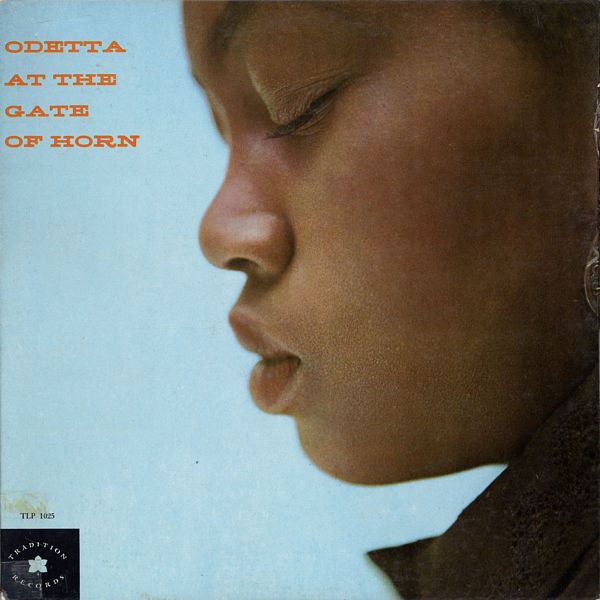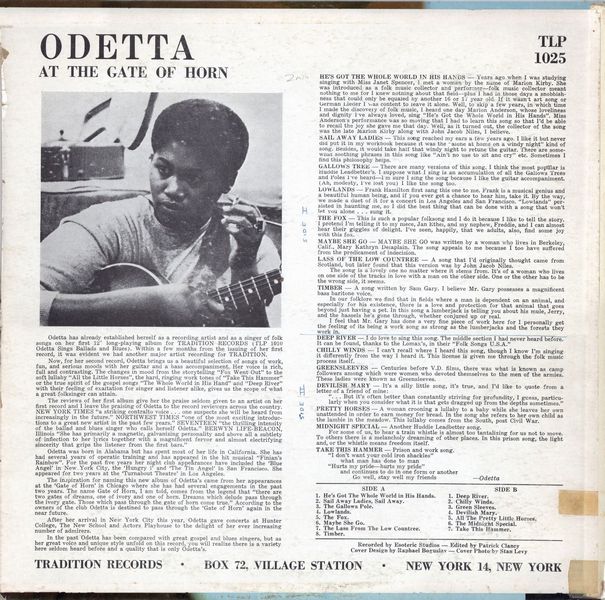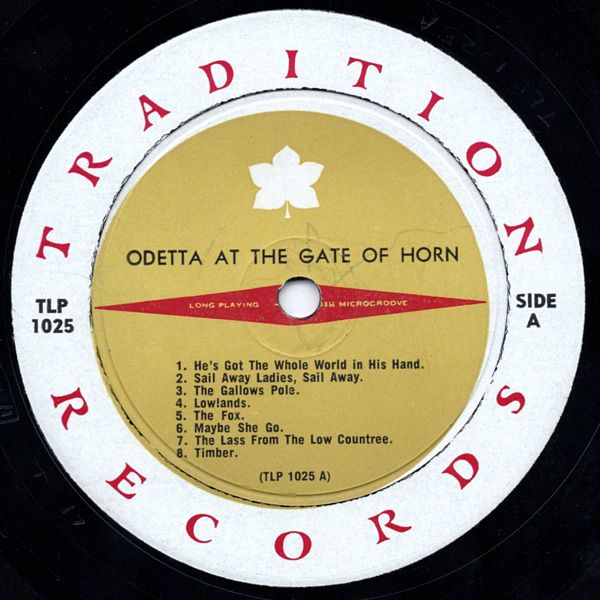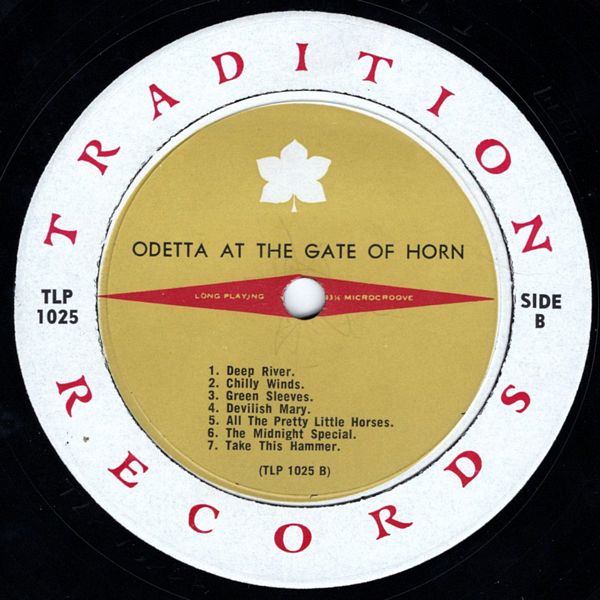

 |



|
Sleeve Notes
Odetta has already established herself as a recording artist and as a singer of folk songs on her first 12" long-playing album for TRADITION RECORDS (TLP 1010 Odetta Sings Ballads and Blues). Within a few months from the issuing of her first record, it was evident we had another major artist recording for TRADITION.
Now, for her second record, Odetta brings us a beautiful selection of songs of work, fun, and serious moods with her guitar and a bass accompaniment. Her voice is rich, full and contrasting. The changes in mood from the storytelling "Fox Went Out" to the soft lullaby "All the Little Horses", the hard, ringing work tones of "Take This Hammer" or the true spirit of the gospel songs "The Whole World in His Hand" and "Deep River" with their feeling of exaltation for singer and listener alike, gives us the scope of what a great folksinger can attain.
The reviews of her first album give her the praise seldom given to an artist on her first record and I leave the praising of Odetta to the record reviewers across the country. NEW YORK TIMES "a striking contralto voice . . . one suspects she will be heard from increasingly in the future." NORTHWEST TIMES "one of the most exciting introductions to a great new artist in the past few years." SEVENTEEN "the thrilling intensity of the ballad and blues singer who calls herself Odetta." BERWYN LIFE-BEACON, Illinois "She has primarily a magnetic, galvanizing personality and above all a subtlety of inflection to her lyrics together with a magnificent fervor and almost electrifying sincerity that grips the listener from the first bars."
Odetta was born in Alabama but has spent most of her life in California. She has had several years of operatic training and has appeared in the hit musical "Finian's Rainbow". For the past five years her night club appearances have included the 'Blue Angel' in New York City, the 'Hungry i' and 'The Tin Angel' in San Francisco. She appeared for two years at the 'Turnabout Theatre' in Los Angeles.
The inspiration for naming this new album of Odetta's came from her appearances at the 'Gate of Horn' in Chicago where she has had several engagements in the past two years. The name Gate of Horn, I am told, comes from the legend that "there are two gates of dreams, one of ivory and one of horn. Dreams which delude pass through the ivory gate. Those which pass through the gate of horn come true." According to the owners of the club Odetta is destined to pass through the 'Gate of Horn' again in the near future.
After her arrival in New York City this year, Odetta gave concerts at Hunter College, The New School and Actors Playhouse to the delight of her ever increasing number of admirers.
In the past Odetta has been compared with great gospel and blues singers, but as her great voice and unique style unfold on this record, you will realize there is a variety here seldom heard before and a quality that is only Odetta's.
HE'S GOT THE WHOLE WORLD IN HIS HANDS: Years ago when I was studying singing with Miss Janet Spencer, I met a woman by the name of Marion Kirby. She was introduced as a folk music collector and performer — folk music collector meant nothing to me for I knew nothing about that field — plus I had in those days a snobbishness that could only be equaled by another 16 or 17 year old. If it wasn't art song or German Liedier I was content to leave it alone. Well, to skip a few years, in which time I made the discovery of folk music, I heard one day Marion Anderson, whose loveliness and dignity I've always loved, sing "He's Got the Whole World in His Hands". Miss Anderson's performance was so moving that I had to learn this song so that I'd be able to recall the joy she gave me that day. Well, as it turned out, the collector of the song was the late Marion Kirby along with John Jacob Niles, I believe.
SAIL AWAY LADIES: This song reached my ears a few years ago. I like it but never did put it in my workbook because it was the "alone at home on a windy night" kind of song. Besides, it would take half that windy night to retune the guitar. There are somewhat soothing phrases in this song like "Ain't no use to sit and cry" etc. Sometimes I find this philosophy helps.
GALLOWS TREE: There are many versions of this song. I think the most popular is Huddie Leadbetter's. I suppose what I sing is an accumulation of all the Gallows Trees and Poles I've heard — I'm sure I sing the song because I like the guitar accompaniment. (Ah, modesty, I've lost you) I like the song too.
LOWLANDS: Frank Hamilton first sang this one to me. Frank is a musical genius and a beautiful human being, and if you ever get a chance to hear him, take it. By the way, we made a duet of it for a concert in Los Angeles and San Francisco. "Lowlands" persisted in haunting me, so I did the best thing that can be done with a song that won't let you alone . . . sung it.
THE FOX: This is such a popular folksong and I do it because I like to tell the story. I pretend I'm telling it to my niece, Jan Ethel, and my nephew, Freddie, and I can almost hear their giggles of delight. I've seen, happily, that we adults, also, find some joy with this fox.
MAYBE SHE GO: MAYBE SHE GO was written by a woman who lives in Berkeley, Calif., Mary Kathryn Deiaplain. The song appeals to me because I too have suffered from the predicament of indecision.
LASS OF THE LOW COUNTREE: A song that I'd originally thought came from Scotland, but later found that this version was by John Jacob Niles. The song is a lovely one no matter where it stems from. It's of a woman who lives on one side of the tracks in love with a man on the other side. One or the other has to be the wrong side, it seems.
TIMBER: A song written by Sam Gary. I believe Mr. Gary possesses a magnificent bass baritone voice. In our folklore we find that in fields where a man is dependent on an animal, and especially for his existence, there is a love and protection for that animal that goes beyond just having a pet. In this song a lumberjack is telling you about his mule. Jerry, and the hassels he's gone through, whether conjured up or real. I feel that Mr. Gary has done a very fine piece of work here for I personally get the feeling of its being a work song as strong as the lumberjacks and the forests they work in.
DEEP RIVER: I do love to sing this song. The middle section I had never heard before. It can be found, thanks to the Lomax's, in their "Folk Songs U.S.A."
CHILLY WINDS: I can't recall where I heard this song, though I know I'm singing it differently from the way I heard it. This license is given me through the folk music process itself.
GREENSLEEVES: Centuries before V.D. films, there was what is known as camp followers among which were women who devoted themselves to the men of the armies. These ladies were known as Greensleeves.
DEVILISH MARY: It's a silly little song, it's true, and I'd like to quote from a letter of a friend of mine: ". . . But it's often better than constantly striving for profundity, I guess, particularly when you consider what it is that gets dragged up from the depths sometimes."
PRETTY HORSES: A woman crooning a lullaby to a baby while she leaves her own unattended in order to earn money for bread. In the song she refers to her own child as the lambie in the meadow. This lullaby comes from the South, post Civil War.
MIDNIGHT SPECIAL: Another Huddie Leadbetter song. For some of us, to hear a train whistle is almost too tantalizing for us not to move. To others there is a melancholy dreaming of other places. In this prison song, the light and, or the whistle means freedom itself.
TAKE THIS HAMMER: Prison and work song. "I don't want your cold iron shackles" what man has done to man "Hurts my pride — hurts my pride" and continues to do in one form or another Go well, stay well my friends
— Odetta